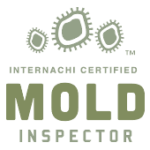Mold Testing

Our nonprofit uses only accredited laboratories for analysis of our mold spore samples to help ensure accurate results. Within two business days of your mold testing, we will send you a complete MoldReport™ that explains the types of mold present, the exposure level relative to the exterior of the home, and the level of exposure inside the home. The report is packed with information on mold issues combined with an easy to read summary and MoldSCORE™ that gives you a specific breakdown on the amount of mold spores found in the home. Protecting yourself and your family from the damaging effects of excessive mold spores in the home with mold testing could not be easier.
Our home inspection includes a thorough examination of every visually accessible component in the home including the roof, attic, exterior, interior and crawlspace or basement. Our inspectors will document visual indications of potential mold problems, moisture intrusion problems and conditions conducive to mold growth (this portion of the report will be uploaded on the day of the inspection). If mold sampling is requested, we will then take one air sample inside the home and one air sample outside the home for comparison. These mold spore traps are sent by FedEx to a certified laboratory that generates a MoldReport™ with results within 2 business days.
In the video above, KATU Channel 2 News highlights Nonprofit Home Inspections’ efforts to help tenants have their own safe living conditions. This piece highlights an inspection that Tom Walther did for one of our clients awhile back. Armed with Tom’s excellent report and independent laboratory results, our clients were able to protect themselves from harmful living conditions. KATU’s story is located at https://katu.com/news/local/portlands-code-inspection-system-may-put-tenants-in-a-bind Thank you KATU for highlighting our work in the community!
